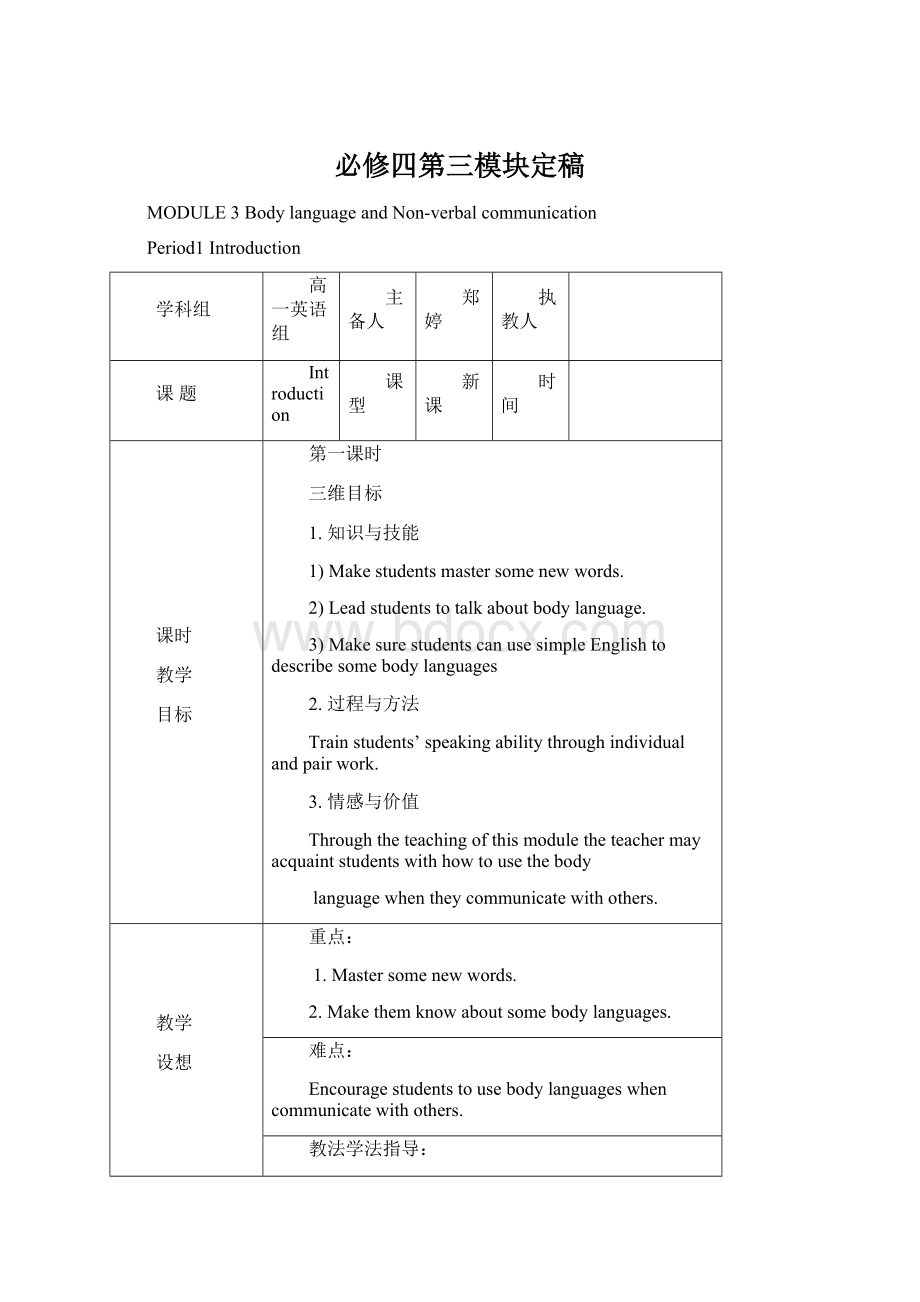必修四第三模块定稿Word文档格式.docx
《必修四第三模块定稿Word文档格式.docx》由会员分享,可在线阅读,更多相关《必修四第三模块定稿Word文档格式.docx(31页珍藏版)》请在冰豆网上搜索。

1.Mastersomenewwords.
2.Makethemknowaboutsomebodylanguages.
难点:
Encouragestudentstousebodylanguageswhencommunicatewithothers.
教法学法指导:
Individualwork,pairworktogeteverystudenttoparticipateintheactivities.
教学程序与策略
个性化修改
→Step1
Greettheclass.
→Step2
Lead-in
Atfirst,letthestudentslookthroughsomepictures.
Andthen,letthestudentsguesswhataretheydoing?
→Step3FinishActivity1(page21)
Matchtheverbsintheboxwiththepictures.
Pointshakesmilewave
ReadoutthewordsintheboxandhavetheSsrepeatthemaftertheteacher.Makesurethattheyunderstandthemeaningsofthesewords.
AsktheSstocompletetheactivity1.
Checktheanswerwiththeclass.
Answers:
a.pointb.wavec.smiled.shake
→Step4Finishactivity3(page21)
Saywhatyoudowhenyou…
Example:
beintroducedtosomeone.Ishakehandsandsay,“Pleasedtomeetyou.”
1.meetafriend
Ishakehandsandsay,“Pleasedtomeetyou.”2.showsomeonethewayIpointinthedirectiontheymustgo.3.seeafriendinthedistanceIwavemyhand.4.enterafriend’shouse
Ishakehandsandsay,“Hello,pleasedtoseeyou.”5.sayyesInodmyheadupanddown.
6.saynoIshakemyheadfromsidetoside.
7.saywho?
Me?
Ipointtomyselfandputonasurprisedexpression.
8.saygoodbye
Ishakehandsandsay,“Goodbye.”
→Step6LanguagePoints
1.point
1)pointto和pointat都含有“指着”的意思,两者一般可以相互换用。
eg.Theteacherispointingat(to)themaponthewall.老师指着墙上的地图。
但主语是事物时,一般用pointto作谓语。
2)pointat可以分开使用,即point后直接跟名词或代词作宾语,再跟介词at表示方向,意为“把……指向”,而pointto却不得分开使用。
eg.Thesoldierpointedhisgunatthedoctor.士兵用枪指着医生。
3)pointout后面还可以接宾语从句。
Eg.PleasepointoutwhereIwaswrong.
Homework:
FinishEx5&
6onpage80afterclass.
教
后
反
思
ReadingandVocabulary
(1)
ReadingandVocabulary
第二课时
三维目标:
1)Trainstudents’readingability.
2)Learnsomeusefulwordsandexpressions.
3)Learnsomethingaboutbodylanguages.
Makestudentsknowmoreaboutbodylanguages.
3.情感与价值
1)Makestudentshaveabetterunderstandingofbodylanguages.
2)Inspiretheirdeterminationtolearn.
3)Encouragestudentstousethebodylanguageswhentheycommunicatewithothers.
1.Helpstudentstounderstandthepassagebetter.
2.Learnandmastersomeimportantwordsandphrasesinthisperiod.
1.Howtohelpstudentsimprovetheirreadingability.
2.Howtomastertheimportantlanguagepointsinthispassage.
1.Fastreadingtogetthegeneralideaofthetext.
2.Intensivereadingtounderstandthepassagebetter.
3.Discussiontohelpstudentsunderstandwhatthey’velearnedbetter.
4.Explanationtohelpstudentsmastersomelanguagepoints.
→Step1Greettheclass.
→Step2Activity1(page32)
Lookatthefollowingpicturesonthescreenandguesswhatwewilllearnintheclass.
→Step3Fastreading
Readthetextquicklyandchoosethebesttitle.
1SayingItWithoutWords
2WheninRome,DoastheRomansDo入乡随俗
3GreetingsAroundtheWorld
4ReadMyMind
Answer:
3
→Step4Skimming
ReadthepassageandmatchcolumnAwithcolumnB
Para1greetingsinAsiancountries
Para2waysofcommunication
ExamplesofgreetingsPara3fascinatingbodylanguage
Para4Bodylanguageisfascinatingforustostudy.
Para5Americanyouth'
sgreetingtoday
→Step5Scanning
B
A
a.Touchingtheirheart,mouthandforehead
b.Shakinghandswiththeirrighthands
c.Joiningtheirhandsandbowingtheirheadsinrespect
d.Puttingtherighthandovertheleftandbowingslightly
e.Greetingeachotherwiththeexpression,“Givemefive!
”
1.EuropeansandAmericans
2.Americanyouths
3.Chinese
4.Muslims
5.Hindus
→Step6Carefulreading
Readthetextcarefullyagainandfinishthefollowingtwotasks:
I.Decidewhetherthestatementsaretrue(T)orfalse(F).
(1)Unconsciousbodylanguageisusedwhenweareintroducedtostrangers.(F)
(2)Wealwaysfeelrelaxedwhenmeetingstrangers.(F)
(3)Everyculturehasdevelopedaformalwaytogreetstrangerstoshowthemwearenotaggressive.(T)
(4)Europeansshakehandswiththeirlefthands.(F)
(5)Weshakehandswhenwemakeadeal.(T)
II.Choosethebestanswers.
1.Whatdoestheword“communication”meaninthepassage?
(D)
A.Wordsandsentences.B.Unconsciousbodylanguage.
C.“Learned”bodylanguage.D.Alloftheabove.
2.“Shakinghands”meansallthefollowingEXCEPT“____D___”.
A.weagreeandwetrusteachotherB.wearenotaggressive
C.werespecteachotherD.ourrighthandsarestrongest
3.WhichofthefollowingstatementsisNOTtrue?
(B)
A.Givinga“salaam”isakindof“learned”bodylanguage.
B.A“highfive”isaformalstyleofgreeting.
C.Whenwemakeadealweshakehands.
D.InAsia,touchingeachotherwhentheymeetisn’tacommongreeting.
4.Whichofthefollowingistheclosestinmeaningtothephrase“giveaway”inthelastparagraph?
A.Givesb.sth.forfreeB.ThrowawayC.GiveupD.Makesth.knowntosb
5.What’stheauthor’spurposeinwritingthepassage?
(C)
A.Toteachushowtogreetothers.
B.Toadviseustouse“learned”bodylanguage.
C.Toofferussomeinformationabout“learned”bodylanguage.
D.Toletusknowwhyweshakehandswhenwemeet.
Homework:
1.Readthepassageagainafterclass.
2.CompleteActivity9-11inReadingonpage81.
Readingandvocabulary
(2)LanguagePoints
LanguagePointsinReadingandvocabulary
第三课时
1)Getthestudentstomastersomeusefulwordsorexpressions
2)Getthestudentstomastersomeimportantdrills.
3)Getthestudentstodosomeexercisesaboutthelanguagepoints.
Explanationtohelpstudentsmastersomelanguagepoints.
Makestudentshaveabetterunderstandingofthispassageandlearntosummarizelanguagepointsbythemselves.
教学设想
Learnandmastersomeimportantwordsandphrasesinthisperiod.
Howtomastertheimportantlanguagepointsinthispassage.
1)Explaining
2)Discovering
3)Practicing
→Step1Greettheclassasusual.
→Step2Haveadictation:
Communication;
vary;
onguard;
formal;
traditionally;
deal;
makeadeal
Involve;
holdup;
giveaway;
mindreader;
unconscious;
→Step3Dowithlanguagepoints.
1.Althoughtheseareveryimportant,wecommunicatewithmorethanjustspokenandwrittenwords.
尽管这些很重要,但我们并不只是通过口头和书面语言交流。
morethan“不只是”,“远甚于”
eg.Itismorethanamuseum;
it’saschool.
2.Likeotheranimals,weareonguarduntilweknowitissafetorelax.
我们感觉到很安全才会放松,否则将一直处于戒备状态。
beonguard有警惕,心存戒备
3.Ifourrighthandisbusygreetingsomeone,itcannotbeholdingaweapon.
如果我们的右手忙着和别人打招呼,就不可能握有武器了。
bebusydoingsth/bebusywithsth.忙着做某事
4.Nowadays,itisquiteacommongreeting.现在,它是一种很常见的打招呼方式。
quite通常放在冠词a/an的前面。
eg.quiteasuccess非常成功vt.变更;
使变化
5.varyvi.不同;
改变;
变化,常用搭配有
varyin在……方面不同varywith随着……而变化
varyfrom不同于……varyfrom...to...由……到……情况不等
varybetween...and...由……到……情况不等
variableadj.可变的;
变化无常的
【即学即练】根据所给的汉语提示完成下列句子,每空一词。
①.这些花的颜色和大小都不相同,但都很漂亮。
Theflowersvaryincolourandsizebutallofthemarebeautiful.
②.这家宾馆每个房间的费用由20美元到30美元不等。
Thechargeforaroominthishotelvariesbetween$20and$30.
③.一般来说,水果和蔬菜的价格随季节变化而变化。
Generallyspeaking,pricesoffruitandvegetablesvarieswiththeseason.
6.spreadvt.铺开;
展开;
伸开vi.伸展,延伸;
传播,传开;
蔓延,传染
n.传播,传布
【拓展】spreadout张开;
伸开;
铺开
eg.Hespreadouthishandsandfoundthecoinhadbeengone.
他伸开手发现硬币不见了。
7.Weshakehandswhenwemakeadeal.达成了协议,我们就握握手.
makeadeal意为“达成协议;
做成交易”;
deal用作名词,意为“交易”
dealwith处理;
应对;
涉及
eg.Themeetingwilldealwiththeseproblems.本次会议将就这些问题作出处理
8.Peoplegiveawaymuchmorebytheirgesturesthanbytheirwords.
人们通过姿势表达的意思要比通过话语表达得更多。
giveaway暴露,泄露;
赠送;
捐赠;
分发(奖品);
失去或错过(机会);
泄露
giveaway短语中away是副词,其宾语如果是代词的话,放在中间。
giveback 归还givein屈服;
让步
giveoff发出;
放出(气味、光等)giveout用完;
分发giveup放弃
EX:
Don’tmentionthatatthebeginningofthestory,oritmay________theshockingending.
A.giveawayB.giveout
C.giveupD.giveoff
解析:
选A。
句意:
不要在故事的一开始就提那件事,不然的话,就泄露了故事令人震惊的结尾。
giveaway暴露;
泄露。
→Step4SummaryandHomework.
Summary:
Thisperiodwedealwithsomedifficultlanguagepointsinthetext,afterclassyoushouldrevisethem.
1.finishtheexerciseonpage80.
2.previewthegrammar1&
2.
Grammar1&
2;
ListeningandVocabulary
Grammar1;
&
2ListeningandVocabulary
第四课时
1.知识与技能
1)Makestudentslearnsomegrammaticalrulesthemselves.
2)Makesurestudentsmasterthegrammaticalitems.
3)Trainstudents’listeningability.
1)Motivatestudents’enthusiasmintakingpartintheclass.
2)Helpstudentstousethesentencepatternsincommunication.
Throughthestu